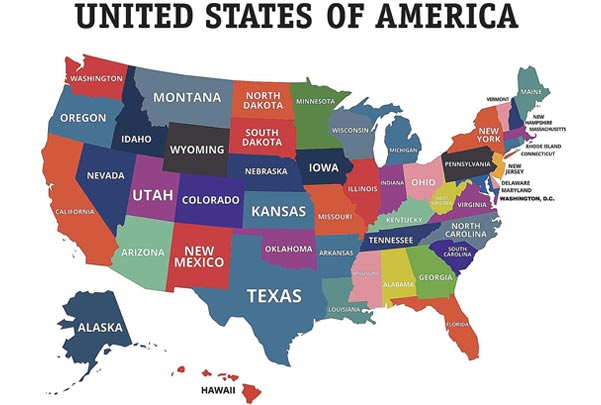Asset Protection Overview
State by State
Every state in the union has different laws regarding “Asset Protection” and all that is related to it, such as “LLCs,” “FLPs,” etc. Each state has different laws regarding “bankruptcy,” “incorporation,” “estate taxes” and so on. Being aware of the laws of the state you’re in (or where you may wish to relocate) could make a difference when it comes to forming a business or protecting your assets.
Alabama
Alabama is known as one of the two greatest plaintiffs’ havens in the U.S.(the other is the Beaumont area of Eastern Texas), with local juries awarding ludicrously high verdicts while the appellate judges seem perfectly content in allowing them. Therefore, you should consider very carefully about opening a business in the state of Alabama.
Furthermore, the Alabama legislature doesn’t think much about homes being worth much, since only $5,000 of a home’s value may be protected from creditors, and it’s double that for a couple. Life insurance in Alabama, if properly structured, can be protected from creditors. However, annuities are fair game past $250 per month. Other than that, the asset protection laws in Alabama are unremarkable.
Alaska
Alaska was the first state to codify the self-settled spendthrift trust (also known as a Domestic Asset Protection Trust) in an attempt to compete with offshore trusts. Saying that the state of Alaska’s trust legislation is anti-creditor is a terrible understatement. Although there are a good many professionals having serious reservations about whether Alaska’s domestic asset protection trust legislation will provide effective asset protection, Alaska’s very low premium tax rate for life insurance makes the state of Alaska a useful jurisdiction for those who desire to purchase life insurance inside a trust.
Arizona
Since the state of Arizona limits the remedy creditors of a member of a limited liability company have to a charging order, it is sometimes used by residents of California as an alternative to the defective California limited liability company which will allow a judge to liquidate a limited liability company’s interest to satisfy creditors. Otherwise, Arizona is a very creditor-friendly state. Arizona gives minimal homestead protection and little protection to the cash value of life insurance policies, but it does afford significant protection to IRAs and pension plans.
Arkansas
The state of Arkansas offers nominal protection to homestead, which is not even worth paying attorney fees to make sure that it applies. Properly structured life insurance arrangements can be protected for creditors. The good news for debtors is that annuities are exempt from creditors.
California
Residents and business owners in the state of California often need very substantial planning assistance. Here are some problems encountered by California residents and businesses:
California’s homestead provides a maximum $125,000 homestead exemption;
California courts have held that the statute of limitations for a fraudulent transfer claim does not begin to run until a creditor obtains a judgment; in most other jurisdictions, the limitation period generally begins at the time of the transfer. Therefore, no transfer in California is safe from a fraudulent transfer claim until at least seven years the stated time in the unique “extinguishment” statute of limitation under the California Uniform Fraudulent Transfer Act has passed;
In California, limited liability companies are subject to stiff gross receipts taxes;
The California Franchise Tax Board is infamous for being very tough;
California debtors have to choose from the state exemption systems only because federal bankruptcy exemptions are not allowed. The state of California divides its exemptions into two systems. Debtors in the state may only opt for one system; they may not pick and choose exemptions from both systems. Selecting the right systems depends on the debtors’ assets, type of bankruptcy filing, and other factors.
Colorado
Colorado offers nominal protection to the homestead, and only protects sale proceeds for up to a year after the property is sold. However, properly structured life insurance and annuity policies are exempt from creditors. Colorado has a Self-Settled Trust Act, but it is not as debtor-friendly a statute the statutes in Alaska.
Connecticut
The state of Connecticut is unremarkable state from a debtor-creditor perspective. Furthermore, it offers only moderate protection for the homestead, but properly structured life insurance policies can be protected.
Delaware
The state of Delaware limits the total amount in exemptions that one can claim. A single person may exempt no more than $5000 total in all exemptions, while a husband and wife may exempt no more than $10,000.
Florida
A number of asset protection planners think of the state of Florida as the last word in debtor-friendly state, since the state constitution provides unlimited protection to homesteaded property for persons having established residency in Florida and provides near total protections for the cash value of life insurance policies and annuities.
However, the recently passed Bankruptcy Act now limits the homestead exemption to $125,000 for interests acquired within a 1215-day (3 years and 4 months) period prior to filing the bankruptcy petition.
Georgia
In the state of Georgia, the statutory creditor protections are poor and offer only nominal protection to homestead, and the cash values of life insurance policies. However, Georgia does protect annuity contracts, IRAs, and many pension plans.
Hawaii
The state of Hawaii is becoming known as one of the leading domiciles for domestic captive insurance company formations. Other than this, considering the exorbitant price of property throughout the Hawaiian Islands, the homestead protections afforded by Hawaii’s statutes are laughable. However, like other states, properly structured life insurance policies and annuity arrangements can be exempt.
Idaho
There is nothing remarkable about the state of Idaho from the viewpoint of a debtor-creditor. Idaho offers basically the same poor creditor exemptions of most other western states, which are low homestead, protection for properly structured life insurance, and little protection for annuities
Illinois
The state of Illinois has a mixed offering bag from an asset protection perspective. The homestead is given only nominal protection. However, the cash value in a properly structured life insurance and annuity contract can be protected.
Indiana
The state of Indiana has opted out of the federal bankruptcy exemptions. Debtors in Indiana are required to use the state’s bankruptcy exemptions. There is very little protection afforded to homestead. However, some protection is afforded to properly structured life insurance arrangements.
Iowa
Iowa is a very good state for debtors. Iowa has an unlimited homestead exemption for property within a certain size as well as having protection for properly structured life insurance arrangements.
Kansas
The state of Kansas is a good asset protection area. Kansas offers an unlimited homestead exemption, and protection for properly structured life insurance arrangements.
Kentucky
Apparently, the Bluegrass State of Kentucky doesn’t think that property there is very valuable, since homestead exemption is only $5,000. Along with that, only a fraction of annuity payments is protected from creditors. However, as with most states, properly structured life insurance policies can be protected from creditors.
Louisiana
The state of Louisiana is one of the most creditor-friendly jurisdictions in the U.S., offering little protection for homestead, life insurance, or annuities. In addition, Louisiana’s version of the Uniform Fraudulent Transfers Act has been tweaked slightly making it even more pro-creditor.
Maine
The homestead exemption in Maine is $35,000. The state of Maine protects life insurance proceeds, annuity payments up to $450 per month, along with a variety of retirement-oriented plans.
Maryland
The state of Maryland has no homestead exemption. However, it does protect properly structured life insurance arrangements. Other then that, Maryland is an unremarkable debtor-creditor state.
Massachusetts
The state of Massachusetts has reasonable homestead exemption and protects properly-structured insurance and annuity contracts.
Michigan
From an asset protection viewpoint, the state of Michigan offers a mixed bag. Only nominal protection is given to the homestead. However, the cash value in properly structured life insurance and annuity contracts can be protected.
Minnesota
The state of Minnesota does the opposite of the normal upper-Midwestern trend of not protecting real estate, but protecting life insurance. While the homestead exemption is not unlimited like the states of Texas and Florida, Minnesota does offer a realistic $200,000 homestead exemption for urban residential property and $500,000 for rural property, which is adjusted for inflation every other year. There are some modest protections given for IRAs and Pension Plans.
Mississippi
Mississippi is a marginally pro-creditor state. Mississippi offers modest homestead protection, and some protection for properly protected insurance arrangements.
Missouri
No information available
Montana
Montana gives a sound $100,000 exemption to homesteads, and protects properly structured life insurance policies along with some pension plans. However, annuities are only protected for a nominal $350 per month. Otherwise, Montana is another unremarkable debtor-creditor state.
Nebraska
The state of Nebraska is a creditor-friendly state which offers minimal homestead protection (sharply contrasting with its neighbors, Iowa and Kansas, which offer unlimited homestead exemptions), and has little protection for life insurance.
Nevada
Taking advantage of California’s business-hostile environment and the fact that it is funded through casino taxes, Nevada has become one of the nation’s leading “domestic” debtor havens. Nevada’s Limited Liability Company and Domestic Asset Protection Trust legislation is second-to-none. On the other hand, the statutory creditor protections are rather poor.
Everyone should be aware of the facts that there are many scam artists who are doing big business in Nevada by selling asset protection schemes and other various tax scams.
New Hampshire
The state of New Hampshire offers modest protection to homestead, and little protection to life insurance.
New Jersey
New Jersey is a creditor-friendly state that offers no homestead exemption but does have some protection to properly structured insurance arrangements.
New Mexico
The state of New Mexico offers a nominal homestead exemption, but protects life insurance arrangements if the beneficiary should be a resident of New Mexico. However, this is a unique restriction and may be contestable on Constitutional grounds.
NNew York
New York provides a pathetically small homestead exemption, does not give annuities any kind of meaningful protection and makes it difficult to protect life insurance. Needless to say, anyone who plans on moving to New York will need a great deal of asset protection planning.
North Carolina
North Carolina chose not to be part of the federal bankruptcy exemption structure, which means that a North Carolina debtor has to choose the state bankruptcy exemptions.
North Dakota
North Dakota allows about $80,000 worth of protection to homestead as well as to properly-structured life insurance arrangements.
Ohio
Ohio is typical of most Midwestern states to the degree as real property is given only token protection from creditors, and life insurance would be protected if structured properly.
Oklahoma
The state of Oklahoma is debtor friendly as it offers an unlimited homestead exemption. Oklahoma has chosen not to be part of the federal bankruptcy exemption structure, and its debtors must follow the state bankruptcy exemptions. Furthermore, the state of Oklahoma has very well-defined limited partnership and limited liability company law. And the existence of several Indian nations in Oklahoma creates very unique business planning opportunities, but everyone should beware of Indian banks because, more often then not, they are shams.
Oklahoma is the first state to adopt a statute which authorizes the creation and funding of self-settled asset protection trusts that can be revoked by the grantor.
Oregon
The state of Oregon real property protection is low, but it does protect properly structured life insurance arrangements.
Pennsylvania
The state Pennsylvania has no homestead protection, although property in tenancy by the entireties may be protected if only one spouse is sued. Pennsylvania also protects properly structure life insurance arrangements and some pension plans.
Rhode Island
Under its system, the state of Rhode Island does not offer homestead protection. However, there is exemption for properly-structured life insurance policies, as are IRAs and Employee Retirement Income Security Act (ERISA) qualified plans
South Carolina
The Palmetto State of South Carolina is the most progressive and aggressive state to develop captive insurance and related businesses. Otherwise, this state offers nominal homestead exemption, inconsistent protection for life insurance, and complete protection for annuity proceeds.
South Dakota
Debtors in South Dakota may only choose from the state bankruptcy exemptions.
Tennessee
Tennessee has chosen to opt out of the federal bankruptcy exemption structure. A debtor in Tennessee has to choose the state bankruptcy exemptions. The homestead protection afforded is nominal but, in some cases, life insurance and annuities are exempted.
Texas
The state of Texas has traditionally been debtor-friendly. It has expansive and unlimited exemptions for homestead, life insurance policies and their cash value, and annuities. In addition, Article 16, Section 28 of the Texas state constitution bans garnishing of wages except in cases involving child or spousal support. There have been literally decades of litigation regarding oil & gas partnerships, thereby giving Texas the best-limited partnership laws of all the states. However, new Bankruptcy legislation caps the unlimited homestead exemption at $125,000 if the homestead property is acquired within 1215 days of filing the bankruptcy petition.
Utah
Even though the state of Utah’s statutory creditor exemptions is typical of a Western state (i.e., little or no protection for real estate, and only a moderate amount of protection for a properly structured life insurance arrangement), Utah has gained notoriety as the nation’s cesspit of asset protection planners. Along with the now-defunct Merrill Scott & Associates, who embezzled their client funds, Utah is home to several planning groups who roam throughout the U.S. giving seminars for expensive asset protection kits that have forms for do-it-yourself asset protection.
Vermont
No information available
Virginia
The state of Virginia is a pro-creditor, and gives very little protection to debtors.
Washington
The state of Washington, like most western states, gives nominal protection to creditors but some protection to properly structured insurance arrangements.
West Virginia
West Virginia tends to be pro-creditor state and offers little protection for homestead but some protection for life insurance.
Wisconsin
As is the case of several Midwestern states, Wisconsin’s creditor exemptions are typical. There is a nominal homestead exemption, and life insurance is protected only if the policy’s beneficiary is a dependent of the policy owner.
Wyoming
It has been said that the state of Wyoming planted the seed for the expansion of asset protection strategies. In 1977, Wyoming was the first state to adopt a true Limited Liability Company Act, which was modeled after the German Gesellschaft mit beschrnkter Haftung (GmbH), which, literally translated, means “Private Limited Company.”
District of Columbia
The District of Columbia has an expansive homestead exemption, and protects properly-structured insurance and annuity contracts .
If you would like more information regarding asset protection, trusts, family limited partnerships or the subject of this article please call or email our office.

ap state by state
-
Alabama
-
Alaska
-
Arizona
-
Arkansas
-
California
-
Colorado
-
Connecticut
-
Delaware
-
Florida
-
Georgia
-
Hawaii
-
Idaho
-
Illinois
-
Indiana
-
Iowa
-
Kansas
-
Kentucky
-
Louisiana
-
Maine
-
Maryland
-
Massachusetts
-
Michigan
-
Minnesota
-
Mississippi
-
Missouri
-
Montana
-
Nebraska
-
Nevada
-
New Hampshire
-
New Jersey
-
New Mexico
-
New York
-
North Carolina
- Florida Statutory Asset Protection
newsletter signup
[forminator_form id=”1485″]

FIGHTING BACK!
